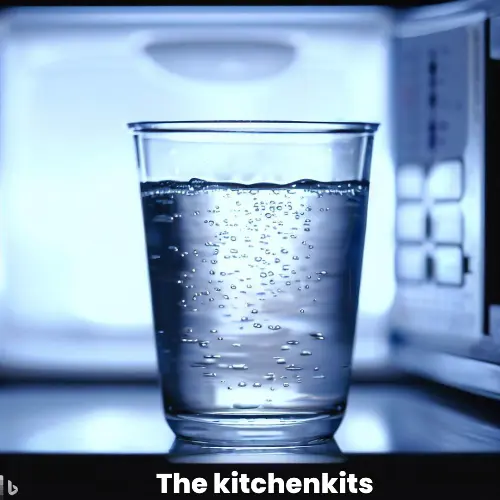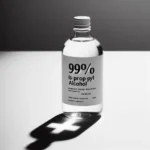Table of Contents
Can You Microwave Distilled Water? What Happens If You Do
Microwaving water is a convenient way to heat and boil water fast. But is it safe to microwave distilled water? And what exactly happens when you microwave distilled water? This article will explain everything you need to know.
Microwaving distilled water is mostly safe, but there are some risks to be aware of. The main risk is the water can become “superheated” and explode out of the container when disturbed. This risk is higher with pure distilled water than normal tap water. However, as long as proper precautions are taken, microwaving distilled water can be a quick and easy cooking method.
What is Distilled Water?
Distilled water is water that has been purified through the process of distillation. This process removes dissolved solids, minerals, and other contaminants from the water. The result is pure water with no dissolved minerals or impurities.
Distilled water is great for use in appliances and processes that require very pure water. Common uses include irons, steamers, automotive batteries, and medical equipment.
However, for drinking, distilled water lacks healthy minerals found in tap water. Most experts recommend drinking distilled water in moderation, if at all, and supplementing mineral intake from other sources.
Why Use Distilled Water in a Microwave?
There are a few reasons why someone may want to microwave distilled water instead of regular tap water:
- Purity – Distilled water has no dissolved minerals or contaminants that could be deposited on food during steaming or cooking. This results in very clean, pure water vapor.
- Prevent Scale Buildup – Minerals in tap water can leave behind white mineral deposits or scale inside the microwave over time. Distilled water helps prevent this.
- Sensitive Applications – For projects like making herbal extracts, distilled water ensures no minerals influence the final product.
- Medical Devices – Heating distilled water to disinfect medical equipment ensures no microbes survive.
So in summary, the purity and mineral-free properties of distilled water make it useful for select heating and cooking applications.
Is It Safe to Microwave Distilled Water?
Yes, microwaving distilled water is generally safe, with a few precautions:
- Use a microwave-safe container – glass or ceramic works best. Avoid metal.
- Don’t microwave an empty container, always have water inside.
- Start with room temperature or cool water – not hot.
- Stop heating before it boils vigorously or splatters.
- Allow the water to rest for 20-30 seconds before removing the container.
The main risk when microwaving any type of water is superheating. This occurs when water is heated past its normal boiling point, without forming bubbles. The water is then unstable and can “explode” out of the container when disturbed.
Why Does Distilled Water Superheat More Easily?
Pure distilled water with no mineral impurities is more prone to superheating than tap water. Here’s why:
Water normally boils when bubbles form on impurity sites and the bubbles allow steam to escape. Tap water has lots of minerals and contaminants that can act as bubble nucleation sites.
However, distilled water has no impurities. So even as it heats up, the water molecules have trouble forming bubbles. This allows the water to become “superheated” – rising far above the normal 212°F boiling point without boiling.
When the superheated water is disturbed, it can flash-boil, sending water spraying out of the container. Obviously, this is dangerous!
How to Microwave Distilled Water Safely
Follow these tips for safely microwaving distilled water:
- Use lower power – Microwave at 50-70% power to heat water gently. This gives time for bubbles to form slowly.
- Add impurities – Put a wooden stick, chopstick, or toothpick in the water to help bubbles form.
- Don’t heat too long – Heat only until just below boiling to prevent superheating.
- Glass container – Glass or ceramic mugs allow you to see boiling. Avoid opaque plastic.
- Wait before removing – Let the water rest 20-30 seconds before taking it out.
- Use hot pads – Use mitts or pads when removing the container as a precaution.
- Stir before use – Swirl or stir the water to release any built-up steam before using.
Following these tips, you can safely use your microwave to boil distilled water with minimal risk. Just exercise caution and never leave heating water unattended.
What If You Accidentally Superheated Water in the Microwave?
If you accidentally let distilled water superheat in the microwave, here’s what to do:
- Don’t remove it! Let the water cool down completely first, at least 5 minutes.
- Do not shake or handle the container until fully cooled.
- Once cooled, very gently swirl the water before opening.
- Open the door carefully, staying as far away as possible.
- Use mitts to remove the container in case hot splashes occur.
With proper care, you can recover from accidental superheating without injury. But prevention is the best approach – use lower power and don’t overheat.
FAQs
Can you microwave distilled water?
Yes, you can microwave distilled water. In fact, microwaving is one of the quickest and easiest ways to heat up water.
What happens if you microwave water?
When you microwave water, the liquid absorbs the microwaves and quickly heats up. However, you need to be cautious about using the microwave to boil water because it can cause the water to reach its boiling point and potentially boil over, making a mess in the microwave.
Can you use the microwave to boil water?
Yes, you can definitely use the microwave to boil water. It is a convenient method that saves time compared to boiling water on a stovetop. Just make sure you use a microwave-safe container of water and keep an eye on it while it heats up.
How long do you microwave water to boil it?
The time it takes to boil water in a microwave depends on the amount of water and the power of your microwave oven. On average, it usually takes around 2-3 minutes for a standard cup of water to reach its boiling point in a microwave.
Can microwaving water cause it to explode?
Microwaving water alone in a microwave-safe container should not cause it to explode. However, extreme caution must be taken when heating water in a sealed or blocked container, as the pressure build-up can lead to an explosion.
What happens if you heat water in a closed container in the microwave?
If you heat water in a closed container in the microwave, the pressure from the steam that is generated can cause the container to burst. It is important to use an open or vented container when heating water in the microwave.
Is it safe to microwave water in a plastic jug?
It is generally safe to microwave water in a plastic jug, as long as the jug is labeled as microwave-safe. However, it is always best to transfer the water into a microwave-safe glass or ceramic container to avoid any potentially harmful chemicals from leaching into the water.
What is the boiling point of water in a microwave?
The boiling point of water in a microwave is 100 degrees Celsius or 212 degrees Fahrenheit, the same as the boiling point of water on a stovetop.
What to do if the water in your microwave overheats?
If the water in your microwave overheats and starts to boil over, immediately stop the microwave and carefully remove the container using oven mitts or other heat-resistant gloves. Allow the water to cool down before handling the container.
Can you use the microwave to make distilled water?
While it is technically possible to use the microwave to make distilled water, it is not the most effective method. Distillation usually requires a more precise and controlled process to separate impurities from the water.
Final Thoughts
Microwaving distilled water is generally safe and effective for quickly heating pure water for cooking, cleaning, and other applications. However, due to the lack of minerals, distilled water is more prone to superheating accidents if overheated.
Follow the proper precautions listed in this article, and you can safely use your microwave to boil distilled water with no worries.
Summary
- Distilled water can superheat more easily than tap water when microwaved
- Adding impurities like wood sticks helps prevent superheating
- Use lower power, glass containers, and don’t overheat the water
- Let the water rest for 20-30 seconds before removing it from the microwave
- Handle superheated water very carefully if it occurs

I’m Ian Welkins, a seasoned professional in the kitchen industry. My passion now drives me to provide invaluable insights into the world of top-notch kitchen products. With years of hands-on experience, I’m your go-to source for culinary excellence.











